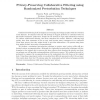Free Online Productivity Tools
i2Speak
i2Symbol
i2OCR
iTex2Img
iWeb2Print
iWeb2Shot
i2Type
iPdf2Split
iPdf2Merge
i2Bopomofo
i2Arabic
i2Style
i2Image
i2PDF
iLatex2Rtf
Sci2ools
146
Voted
ICDM
2003
IEEE
2003
IEEE
Privacy-Preserving Collaborative Filtering Using Randomized Perturbation Techniques
Collaborative Filtering (CF) techniques are becoming increasingly popular with the evolution of the Internet. E-commerce sites use CF systems to suggest products to customers based on like-minded customers’ preferences. People use CF systems to cope with information overload. To conduct collaborative filtering, data from customers are needed. However, collecting high quality data from customers is not an easy task because many customers are so concerned about their privacy that they might decide to give false information. CF systems using these data might produce inaccurate recommendations. We propose a randomized perturbation technique to protect users’ privacy while still producing accurate recommendations. Although the randomized perturbation techniques add randomness to the original data to prevent the data collector from learning the private user data, our scheme can still provide recommendations with decent accuracy. We conducted several experiments to compare the recommend...
Accurate Recommendations | CF Systems | Data Mining | ICDM 2003 | Randomized Perturbation Techniques |
Related Content
| Added | 04 Jul 2010 |
| Updated | 04 Jul 2010 |
| Type | Conference |
| Year | 2003 |
| Where | ICDM |
| Authors | Huseyin Polat, Wenliang Du |
Comments (0)

